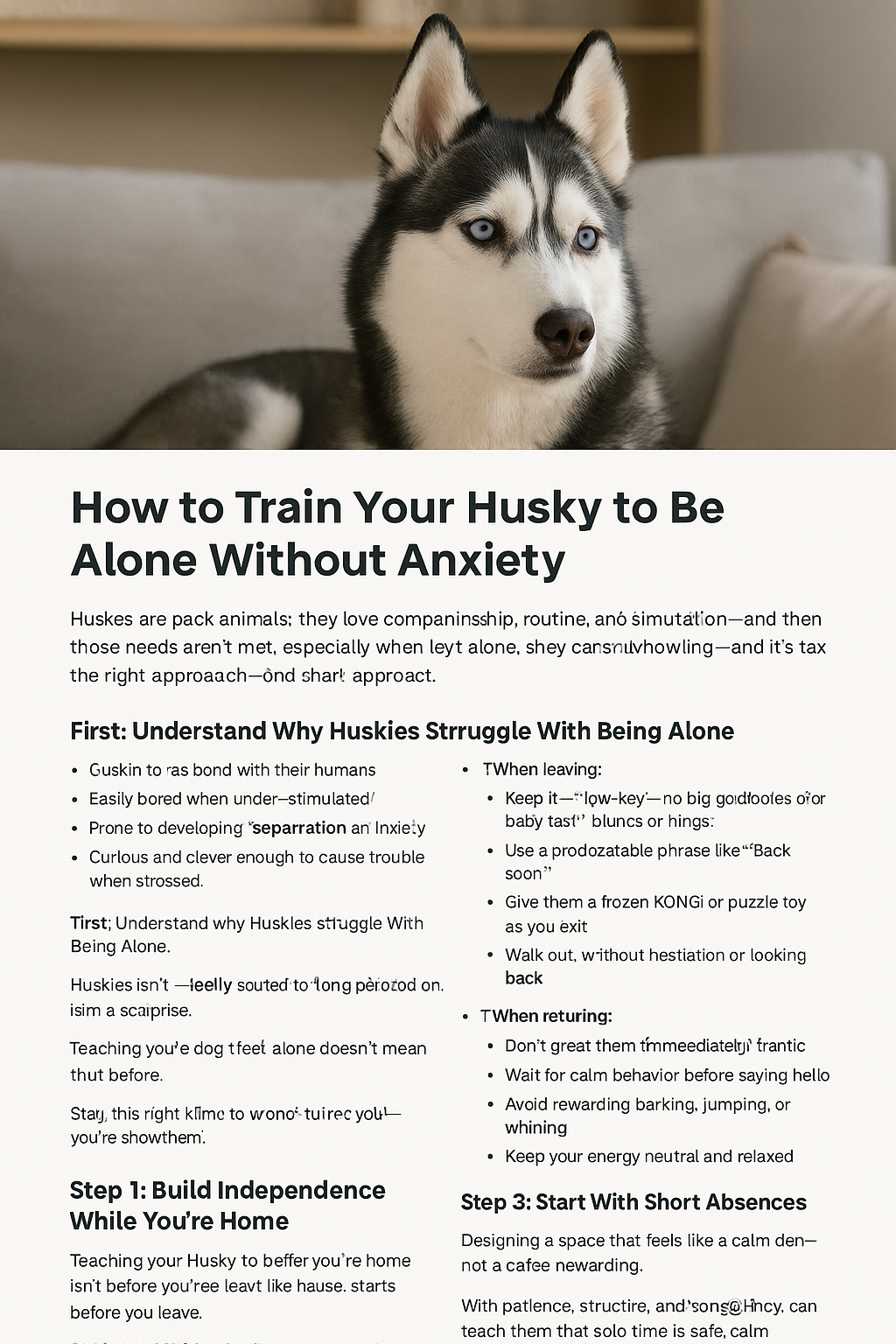Huskies thrive on their pack and love stability, plus engaging stuff. When stuff goes amiss, specifically when left alone, they could become super anxious, wreck things, or just howl like crazy. Does this sound familiar?
While, yes, huskies aren’t always the best soloists, they actually can become chill, sure of themselves, and quite independent when you’re out. All it needs is the correct tactics, like, well, trust, repeating stuff and a little bit of clever training.
Let’s get started. Here is how to teach your Husky to chill when alone, without, you know, freaking out.
First up: Get why Huskies have issues alone time
Huskies ain’t “needy,” They’re hella social and intelligent. Because of this mix, they become:
Besties fast with their humans
Gets bored if it ain’t interesting enough
Prone to that separation anxiety
Curious enough to make messes when stressed
Add in all that energy and a big voice, so no big surprise that they find time alone difficult.
Step 1: Work on independence right at home
Training your Husky to be alone starts before you even go anywhere.
Getting them used to being distant from you helps alot, even near by.
Trying a baby gate could separate them, meanwhile you’re elsewhere
Get them comfy, settle them, while you wander about
Stop following, stop answering whines, constantly
Reward calm, cool behaviour when all alone.
Starting short builds their confidence, naturally, that’s the aim. Showing being solo isn’t always a downer.
Practising calm comings and goings helps.
How you leave, how you come back…huge for your dog’s anxiety
When you’re off, keep things subtle: no huge goodbyes or silly talk
A predictable phrase? try ‘be back shortly!’
Give them a Kong or puzzle thingy, right before!
Then, just go—no hesitations, not look’n back.
Com’n home:
If they’re freaked, wait a minute.
Before any greetings, wait for calm.
Forget the barking, jumping, or whine. Nope!
Keepin’ your energy even, easy going.
This way, your Husky’ll know: returns are routine, not stress-full.
Start small with absenses, seriously
Don’t do 8 hours straight! Nah. Start small: one or two minutes, building it slowly.
Vary this process by going outside for, say, half-a-minute
Increase this time slowly, to a couple minutes, then five minutes perhaps.
Mix up your routine, sometimes forgetting the keys, or maybe not
Use a camera for monitoring, viewing their activities live.
Progress only when your Husky seems relaxed, at the present moment, in current step.
Making it Positive, a Safe Zone
Construct a space, a calming den—not one that’s feeling like a cage, if that makes sense.
Should have:
A cozy bed or crate if crate-trained.
Some toys or chew-safe bones will do.
Maybe play some relaxing tunes or use white noise.
Provide water, with some comforting things carrying your scent.
This should be part of day-to-day living, don’t restrict this space, you know, to times when you’re gone. Allow relaxation in this area, in moments of peace, as you’re around
Enrichment, for Filling the Time
Mental engagement actually fights anxiety. This will do wonders. Try:
Frozen KONGs.
Toys that dispense treats puzzles will work too.
Snuffle mats also.
Chew toys that are safe, or bully sticks.
toys that’s like, “only while i’m away”, on rotation.
It teachs the dog nice things happens when you, like, aren’t there
Don’t ever Punish Damaging Behavior
If there’s damage when you get back—chewed things or accidents—stay chill, please
Punishing afterwards never works. It’s mostly a bust
That sort of response really increases both fear, and confusion
Instead:
Give your leaving routine a lookover.
Boost exercise also enrichment.
Try recording their behavior, it give clues.
Adapt their crate also roaming as needed.
Destructive behavior its a symptom. Get to the core of it, don’t focus on what happen.
Exercise Before Leaving
A Husky full of energy usually gets anxiety. Try a workout before you head out the door:
Walk, jog or a solid game of play for like 30–60 minutes
A short training too for some thinking games.
Quiet down before your departure.
Tired Huskies will rest, under-exercised ones they’ll panic.
If your Husky continues with anxiety even after training:
Chat with a dog trainer. Make sure positive only!
Vet help, for bad cases.
Consider fast acting things for anxiety, like chews and that.
Don’t delay, get help quick. Helps long-term.
Final Thoughts Teach Independence:
Your Husky can actually handle time alone. Be patient, structured and regular with it, they’ll get solo time’s cool!
Soon they learn you’ll be back, they’ll chill and nap instead.
A confident Husky? Well, that’s a calm one, ain’t it, and that inner peace? Makes all the difference. See?
